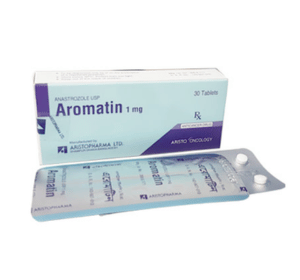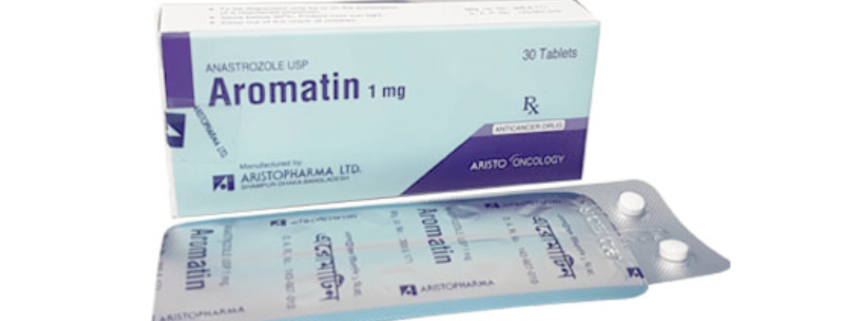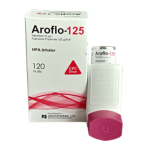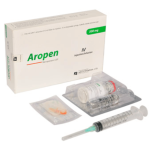Aromatin (Anastrozole)

Therapeutic Group : Aromatase Inhibitor
Presentation:
Aromatin 1 mg Tablet: Each film coated tablet contains Anastrozole USP 1 mg.
Indications:
Adjuvant treatment: Aromatin is indicated for adjuvant treatment of postmenopausal women with hormone receptor positive early breast cancer.
First line treatment: Aromatin is indicated for the first-line treatment of postmenopausal women with hormone receptor positive or hormone receptor unknown locally advanced or metastatic breast cancer.
Second line treatment: Aromatin is indicated for the treatment of advanced breast cancer in postmenopausal women with disease progression following tamoxifen therapy.
Dosage & Administration:
The dose of Aromatin is 1 mg tablet taken once daily. For patients with advanced breast cancer, Aromatin should be continued until tumor progression. Aromatin can be taken with or without food. For adjuvant treatment of early breast cancer in postmenopausal women, the recommended duration of treatment should be 5 years.
Contrainidications:
Anastrozole is contraindicated in any patient who has shown a hypersensitivity reaction to the drug or to any of the excipients. Observed reactions include anaphylaxis, angioedema and urticaria.
Warning & Precautions:
Pregnancy: Pregnancy category X. Anastrozole can cause fetal abnormalities and risks, and the risks involved in use of the drug in pregnant women clearly outweigh potential benefits.
Nursing mothers: It is not known whether Anastrozole is excreted into human milk or not. Caution should be exercised if Anastrozole is administered to women who are breast feeding.
Pediatric use: The safety and efficacy of Anastrozole has not been established in pediatric cases.
Geriatric Use: The pharmacokinetics of Anastrozole is not affected by age. In case of efficacy, Anastrozole gives better result in women with > 65 years old.
Premenopausal women: Anastrozole offers no clinical benefit to premenopausal women with breast cancer.
Ischemic cardiovascular events: Caution should be exercised if Anastrozole is administered to women with pre-existing ischemic heart disease.
Renal impairment: The renal impairment does not influence the total body clearance. Dosage adjustment in patients with renal impairment is not necessary.
Hepatic impairment: Dosage adjustment is also not necessary in patients with stable hepatic cirrhosis. Anastrozole has not been studied in patients with severe hepatic impairment.
Side effects:
Common adverse reactions: Common adverse reactions (occurring with an incidence of > 10%) in women taking Anastrozole included: hot flashes, asthenia, arthritis, pain, arthralgia, hypertension, depression, nausea and vomiting, rash, osteoporosis, fractures, back pain, insomnia, headache, bone pain, peripheral edema, increased cough, dyspnea, pharyngitis and lymphedema. Dermatologic: Skin reactions such as lesions, ulcers, or blisters (less than 1 in 10,000 patients). Allergic effects: Allergic reactions with swelling of the face, lips, tongue and/or throat. This may cause difficulty in swallowing and/or breathing (less than 1 in 10,000 patients). Hematologic: Changes in blood tests of the liver function, including inflammation of the liver (less than 1 in 10,000 patients). Bone effects: Clinical trial showed that patients receiving Anastrozole had a mean decrease in both lumbar spine and total hip bone mineral density (BMD). Cholesterol: Anastrozole may cause increase in serum cholesterol level.
Drug interaction:
Tamoxifen: Co-administration of Anastrozole and tamoxifen in breast cancer patients reduced Anastrozole plasma concentration by 27%. Tamoxifen should not be administered with Anastrozole. Estrogen: Estrogen-containing therapies should not be used with Anastrozole. Warfarin: Anastrozole doesn’t alter the activity of both R- and S-warfarin. Cytochrome P450 enzyme: The inhibition of cytochrome P450 enzymes by Anastrozole doesn’t affect the action of other drugs.
Packing:
Each box contains 30 Aromatin tablets in Alu-PVDC blister pack.



